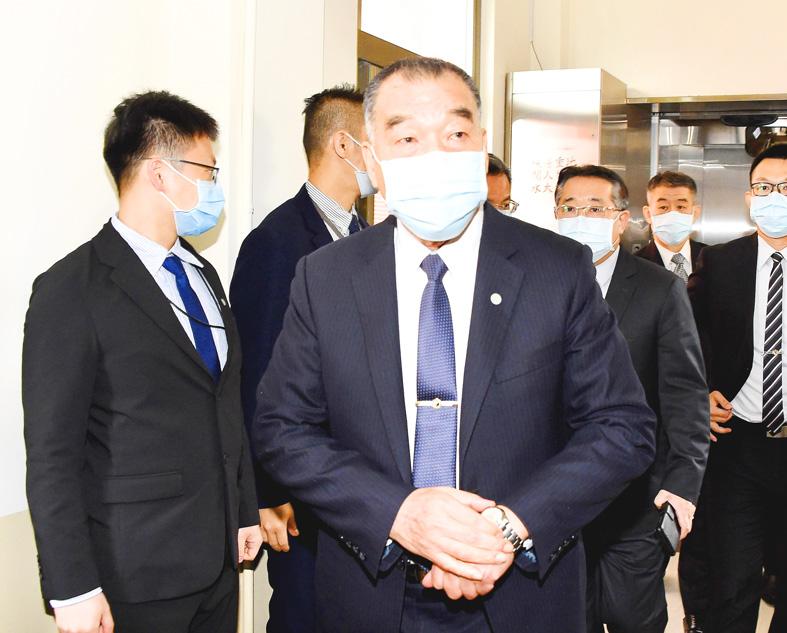Taiwan plans to incorporate lessons learned from Russia’s invasion of Ukraine into upcoming military exercises aimed at practicing fighting off a Chinese attack, the Ministry of National Defense said yesterday.
Taiwan has raised its alert level since the Russian invasion of Ukraine, wary of the possibility Beijing might make a similar move, although it has reported no signs that this is about to happen.
What lessons to learn from the war in Ukraine on how the nation could defend itself if China attacked have been widely debated in Taiwan, and discussed with the US, Minister of National Defense Chiu Kuo-cheng (邱國正) has said.

Photo: CNA
This year’s Han Kuang military exercises would be split into two parts to be held next month and in July, the ministry said in a statement.
Next month’s events would include a tabletop exercise based on “various possible actions of the Chinese Communist Party ... to invade Taiwan, taking into account the lessons of the Russian-Ukrainian war,” the ministry said.
There will also be five days of drills with soldiers, including live-fire exercises that would take place in July, it added.
The Han Kuang exercises would focus on attacking the enemy at sea, preserving combat forces and “integrating the total force of the whole people to support military operations,” the ministry said, referring to civil defense and reservist reforms that aim to improve Taiwan’s ability to fight a war with China.
While Taiwanese officials have seen many parallels in the Ukraine war and their own situation, including having their own giant neighbor with territorial ambitions, they have also pointed to major differences.
For example, Taiwan has talked of the “natural barrier” of the Taiwan Strait, which would make China putting troops on the ground much more difficult than just crossing a land border.

A preclearance service to facilitate entry for people traveling to select airports in Japan would be available from Thursday next week to Feb. 25 at Taiwan Taoyuan International Airport, Taoyuan International Airport Corp (TIAC) said on Tuesday. The service was first made available to Taiwanese travelers throughout the winter vacation of 2024 and during the Lunar New Year holiday. In addition to flights to the Japanese cities of Hakodate, Asahikawa, Akita, Sendai, Niigata, Okayama, Takamatsu, Kumamoto and Kagoshima, the service would be available to travelers to Kobe and Oita. The service can be accessed by passengers of 15 flight routes operated by

Chinese spouse and influencer Guan Guan’s (關關) residency permit has been revoked for repeatedly posting pro-China videos that threaten national security, the National Immigration Agency confirmed today. Guan Guan has said many controversial statements in her videos posted to Douyin (抖音), including “the red flag will soon be painted all over Taiwan” and “Taiwan is an inseparable part of China,” and expressing hope for expedited reunification. The agency last year received multiple reports alleging that Guan Guan had advocated for armed reunification. After verifying the reports, the agency last month issued a notice requiring her to appear and explain her actions. Guan

GIVE AND TAKE: Blood demand continues to rise each year, while fewer young donors are available due to the nation’s falling birthrate, a doctor said Blood donors can redeem points earned from donations to obtain limited edition Formosan black bear travel mugs, the Kaohsiung Blood Center said yesterday, as it announced a goal of stocking 20,000 units of blood prior to the Lunar New Year. The last month of the lunar year is National Blood Donation Month, when local centers seek to stockpile blood for use during the Lunar New Year holiday. The blood demand in southern Taiwan — including Tainan and Kaohsiung, as well as Chiayi, Pingtung, Penghu and Taitung counties — is about 2,000 units per day, the center said. The donation campaign aims to boost

The Central Weather Administration (CWA) said a magnitude 4.9 earthquake that struck off the coast of eastern Taiwan yesterday was an independent event and part of a stress-adjustment process. The earthquake occurred at 4:47pm, with its epicenter at sea about 45.4km south of Yilan County Hall at a depth of 5.9km, the CWA said. The quake's intensity, which gauges the actual effects of a temblor, was highest in several townships in Yilan and neighboring Hualien County, where it measured 4 on Taiwan's seven-tier intensity scale, the CWA said. Lin Po-yu (林柏佑), a division chief at the CWA's Seismological Center, told a news conference